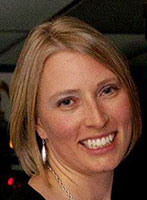Jennifer Bosch, a doctoral student at Horn Point Laboratory in Cambridge, will spend a year as a Knauss Marine Policy Fellowship recipient at the National Oceanic and Atmospheric Administration’s (NOAA) headquarters in Silver Spring, MD.
 Selected as one of 38 fellows from hundreds of applicants, Bosch will serve as a science communicator, ensuring that the research conducted by the agency’s scientists is in sync with the priorities set by the top policymakers. She said she was “very excited, doing something I’ve wanted to do for more than 10 years.”
Selected as one of 38 fellows from hundreds of applicants, Bosch will serve as a science communicator, ensuring that the research conducted by the agency’s scientists is in sync with the priorities set by the top policymakers. She said she was “very excited, doing something I’ve wanted to do for more than 10 years.”
Bosch will be a program analyst in NOAA’s Office of Laboratories and Cooperative Institutes. She will learn about the agency’s scientific activities and research and its labs, communicating with both the upper levels of NOAA engaged in policymaking and lab directors and scientists conducting actual research.
Mike Roman, HPL director, said, ”I feel really proud of Jen, whose selection is testament to her hard work as a doctoral student in marine science and the quality of the science being conducted at our lab. As a fellow at NOAA, she will work with exceptional people involved in policymaking and research in oceanography and fresh water science, as well as atmospheric and climate sciences.”
Bosch said the coveted Knauss Fellowship, named for a former NOAA administrator, is targeted at Master’s and Ph.D candidates like her who are finishing their graduate studies. Her doctorate concerns marine ecology, specifically nutrient recycling in Chesapeake Bay sediments and the role played by worms in the recycling process.
Bosch received her bachelor’s degree from Rutgers University and her master’s from the University of Maine before enrolling at Horn Point Lab, which is part of the University of Maryland Center for Environmental Science.
After Jennifer Bosch receives her doctorate, she would like to continue as a science communicator. “Having a scientific background, understanding the language and culture, I can interpret scientific research and explain it,” she said.

